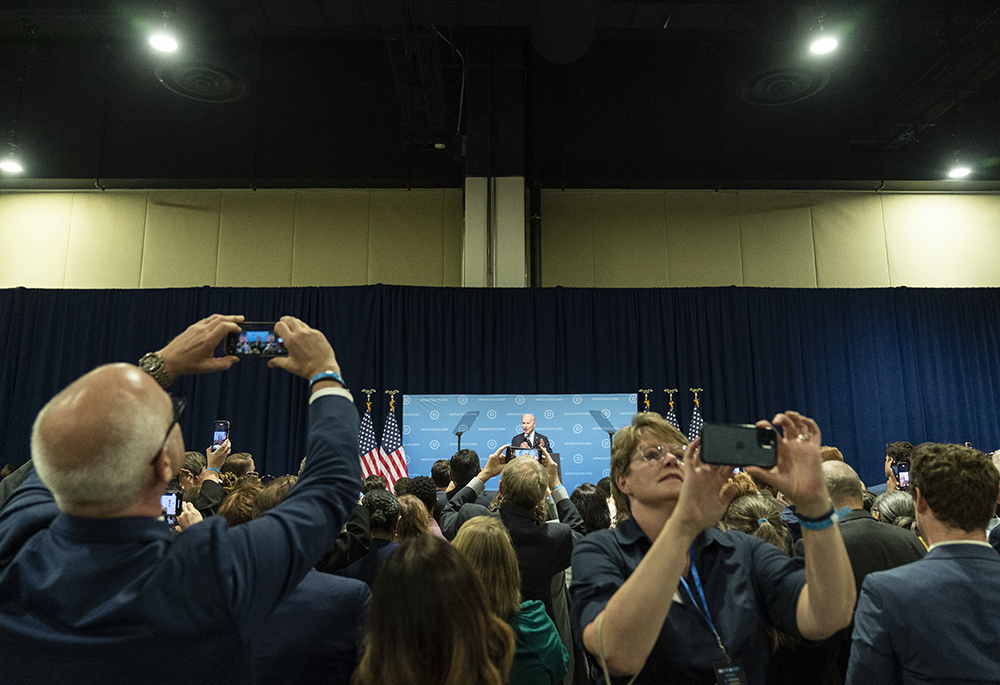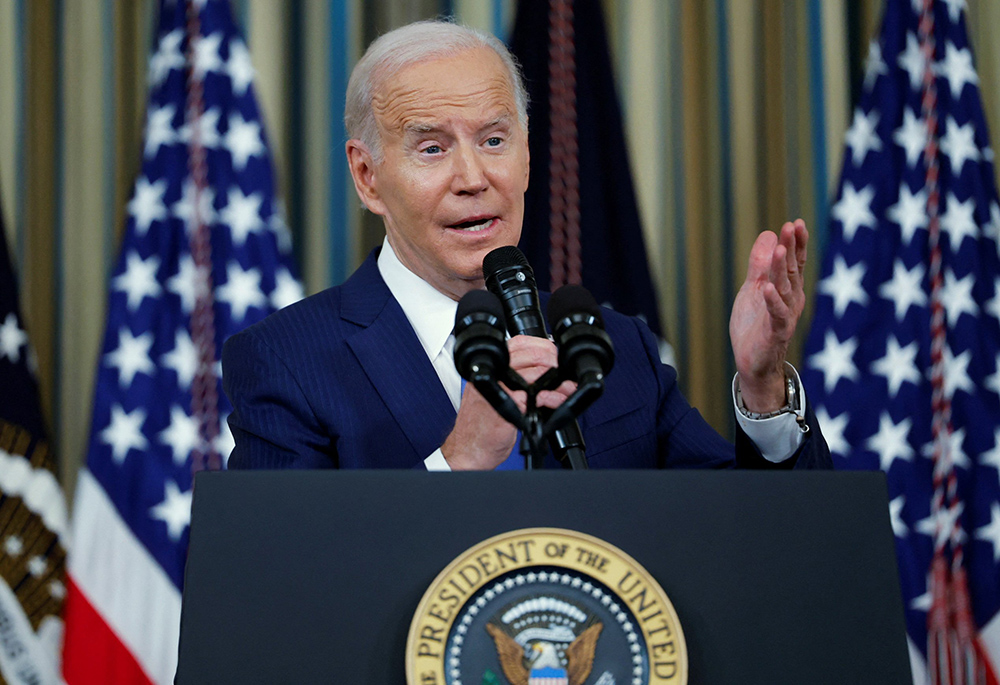
Supporters take pictures as President Joe Biden speaks at a Democratic National Committee event at the Gaylord National Resort and Convention Center, Sept. 8, 2022, in Oxon Hill, Maryland. (AP photo/Alex Brandon)
The phrase "inside the Beltway" is not really a geographic designation. It designates a type of parochialism; specifically, it is a charge of insularity made against those who work in Washington, D.C., with a strong suspicion of elitism. And, "inside the Beltway" thinking is stalking the Democratic Party at the moment.
Two articles at Politico demonstrate the phenomenon. The first, "Biden dives into debt ceiling talks, causing mini panics among his base," shares the concerns of mostly progressive Democrats that President Joe Biden will agree to a compromise with House Republicans on the debt ceiling fight, and that some of the items the GOP gets into the compromise will be unacceptable to the base.
Sen. Elizabeth Warren, whom I greatly admire and usually agree with on economic issues, told Politico she was "very concerned" that Biden might agree to work requirements for some federal assistance programs like Medicaid, which she described as "efforts to just tangle aid recipients in red tape in the hope that they will be choked to death rather than get the help they need."
Warren also warned that budget caps "are not cost free. They keep the economy hobbled and that means fewer people with jobs, fewer mamas with access to child care, fewer sick people who can get well and get back to work."
Warren is right about everything but the politics. The Democrats need to do a much better job showing they are fiscally responsible with taxpayers' dollars. At a time when many people have trouble balancing their checkbooks at the end of the month due to inflation, people want to know that the government is being careful with its money, too. As a rule, Republicans are just as willing to spend money in the form of tax cuts as Democrats are in the form of social programs, and only the latter have any socially redeeming value.
But that is not how the issue plays outside the Beltway. Republicans make it sound like the middle class are getting tax breaks when it is the wealthy who garner the vast majority of them. Democrats win on social programs that are universal like Social Security and Medicare, but need to find a better way of explaining the value of social programs that aim to give a hand up to those struggling at the bottom of the socioeconomic ladder. On its face, a work requirement doesn't sound morally offensive. Opposing it is not self-explanatory.
Republicans are just as willing to spend money in the form of tax cuts as Democrats are in the form of social programs, and only the latter have any socially redeeming value.
But that is not how the issue plays outside the Beltway.
And, in the event, Sr. Mary Haddad of the Catholic Health Association, just delivered a fine explanation about why work requirements are "misguided and ineffective."
The larger messaging problem here is that so little in our contemporary, consumer society elevates solidarity as a virtue. Relatedly, liberal strategies have placed race and gender ahead of class in their calculations of how to reach voters. The combined result: Democrats have failed to articulate a political vision that is both aspirational and inclusive.
The party leaders talk about inclusivity, but they never seem to include white working-class voters in that picture. Those voters are told they have white privilege, and privileged is not how many working-class voters feel, not since the jobs were exported, the unions were broken and opioids became the only growth industry. Then Democrats wonder why they struggle to win states like Michigan, Pennsylvania and Wisconsin.
The other Politico story was "Democrats may only have themselves to blame for Biden's grim approval ratings." The article shows that Republicans spent millions on ads in the midterms that attacked Joe Biden while the Democrats tended not to mention Biden in their ads. "I don't think people really know how much Biden was just personally pummeled throughout the entire midterms to a bunch of voters in key states and congressional districts," according to Jenifer Fernandez Ancona, of Way to Win, the group that studied ad spending.

President Joe Biden answers a question during a news conference in the State Dining Room at the White House Nov. 9, 2022, in Washington, a day after the 2022 U.S. midterm elections. (CNS/Reuters/Tom Brenner)
This article attests to a problem that is both organizational and rhetorical. The two parties are no longer cohesive party structures. Their campaigns and even their national conventions are governed by marketing strategies. Formerly, conventions hammered out platforms and platforms mattered. At some point in the 1970s and '80s, presidential candidates realized they could satisfy activists by including particular language in the party platform but feel no obligation to act upon it once elected. This turned out to be more than a recipe for cynicism. Parties lost sight of their role in shaping public opinion, not simply catering to it. Special interest groups became vehicles for campaign funds and ideas, compounding the centrifugal forces at work.
We saw this play out in the 2010 midterms when Republicans ran on their opposition to the Affordable Care Act, but Democrats tended to ignore the issue entirely. According to an article at the time, Democratic "party officials in Washington can't identify a single House member who's running an ad boasting of a 'yes' vote — despite the fact that 219 House Democrats voted in favor of final passage in March."
Advertisement
Guess what? The ACA remained unpopular until it became obvious to all that the GOP's dire predictions about the law were not coming true.
The problems with messaging and organization identified by these two Politico articles are compounded by the Democrats' problem with young people who staff campaigns. David Shor, a campaign strategist and data guru, has been most outspoken in raising the concern: Wealthy, highly educated young people are those most likely to staff Democratic campaigns, and "they tend to hold views that are both more liberal and more ideologically motivated than the views of the coveted median voter, and yet they yield a significant amount of influence over the party's messaging and policy decisions." This exacerbates what Doug Sosnik, writing in The New York Times, deemed "the diploma divide" in American politics, with college graduates voting overwhelmingly for Democrats and non-college voters voting overwhelmingly for Republicans.
A Democratic Party that takes its moral bearings from highly educated elites and loses the ability to speak to America's working class is a Democratic Party that may or may not be able to win elections. But it will no longer be a party that commands the loyalty of Catholics concerned about increasing social solidarity. And the alternative, a Republican Party increasingly committed to authoritarian means and reactionary goals, is even worse! If the Democrats do not get out of the Beltway and the faculty lounge, and start talking to workers, the future is too horrible to contemplate.





